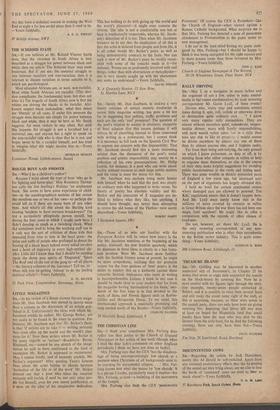LITTLE MAGAZINES
SIR,—In his review of a dozen current literary maga- zines Mr. Dan Jacobson was moved to devote more than a column to the discussion of an article pub- lished in X. Unfortunately the ideas with which Mr. Jacobson credits its author, Mr. George Barker, are not easily to be found in the essay in question. For instance, Mr. Jacobson says that Mr. Barker's thesis is that 'if writers are to take tl .ir writing seriously they must offer up the world and the world's plea- sures for it.' Now these writers whom Mr. Barker in his essay regards as `serious'—Baudelaire, Byron. Rimbaud, etc.—cannot by any stretch of the imagi- nation be said to have conformed to the kind of asceticism Mr. Barker is supposed to recommend. May I restate briefly, and of necessity crudely, Mr. Barker's argument? After quoting Yeats's famous lines about the artist having to choose between 'perfection of the life or of the work' Mr. Barker pointed out that a poet who takes his vocation seriously will forfeit, if need be, not only other peo- ple but himself, even his own moral justification as a man, on the altar of his imaginative dedication.
This has nothing to do with giving up 'the world and the world's pleasures'—it might even connote the reverse. The idea is not a comfortable one but at least is intellectually respectable, whereas Mr. Jacob- son's distortion of it is not. Thus when Mr. Jacobson wanders on to say that the implication of all this is that the artist is isolated from people and from life, it is all rather beside Mr. Barker's point, as well as being demonstrably contrary to the facts. Nor can such a view of Mr. Barker's essay be readily recon- ciled with some of the remarks made in it—for instance, 'Poems are so profoundly involved with real things, rather than with abstractions or metaphysics— one is very closely caught up with the phenomena one seeks to understand.'—Yours faithfully, St. Martins Lane, WC2










































 Previous page
Previous page